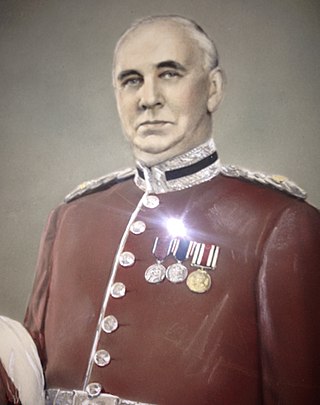Related Research Articles

Orkney and Shetland is a constituency of the House of Commons of the Parliament of the United Kingdom. It elects one Member of Parliament (MP) by the first past the post system of election. In the Scottish Parliament, Orkney and Shetland are separate constituencies. The constituency was historically known as Orkney and Zetland.
Banffshire was a constituency of the House of Commons of Great Britain from 1708 to 1800, and of the House of Commons of the Parliament of the United Kingdom from 1801 to 1983. It elected one Member of Parliament (MP), using the first-past-the-post voting system.
Grantham was a Parliamentary constituency in Lincolnshire, England.
Kincardineshire was a constituency of the House of Commons of the Parliament of Great Britain from 1708 to 1801 and of the Parliament of the United Kingdom from 1801 to 1918. It was represented by one Member of Parliament (MP).
Oldham was a parliamentary constituency centred on the town of Oldham, England. It returned two Members of Parliament (MPs) to the House of Commons of the Parliament of the United Kingdom. The constituency was created by the Reform Act 1832 and was abolished for the 1950 general election when it was split into the Oldham East and Oldham West constituencies.

Sir Robert Pattinson, JP, DL was a British Liberal politician and businessman. Pattinson joined his family's railway contracting firm after finishing school and was quickly appointed to senior positions. In 1900, he became chairman of Ruskington Urban District Council and four years later joined Kesteven County Council, eventually becoming an alderman and serving as its chairman for 20 years between 1934 and his death in 1954. He chaired the Sleaford Liberal Association (1900–18) and was nominated as the party's representative for Sleaford shortly before World War I broke out. He contested Grantham unsuccessfully in 1918, but was returned for the seat in 1922, serving until he was defeated in the following year's general election. Several other unsuccessful attempts at a parliamentary career followed. He chaired several bodies responsible for maintaining Lincolnshire's waterways, served as a magistrate for Kesteven and Lindsey and sat as Lincolnshire's High Sheriff in 1941. Knighted in 1934, Pattinson died aged 82 in 1954 after several years of illness.
James William Barclay was a Scottish businessman, farmer and politician. For nineteen years he was member of parliament for Forfarshire.

Sir John Plowright Houfton was a British colliery owner and politician from Mansfield in Nottinghamshire. He sat in the House of Commons from 1922 to 1923.

John Edward Jenkins, known as Edward Jenkins or J. Edward Jenkins, was a barrister, author and Liberal Party politician in the United Kingdom. He was best known as an author of satirical novels, and also served as the Agent-General of Canada, encouraging emigration to the new Dominion. He contested several parliamentary elections, but won only one, and sat in the House of Commons from 1874 to 1880.
Charles James Fleming, KC was a British barrister and Liberal Party politician. He sat in the House of Commons from 1892 to 1895, but his parliamentary career was cut short when he fell out with the Liberal Party in his constituency. His business ventures failed, and he was made bankrupt.
The 1911 Kilmarnock Burghs by-election was a Parliamentary by-election held on 26 September 1911. It returned one Member of Parliament (MP) to the House of Commons of the United Kingdom, elected by the first past the post voting system. The constituency consisted of five parliamentary burghs: Kilmarnock in the county of Ayr, Dumbarton in the county of Dumbarton, Rutherglen in the county of Lanark and Renfrew and Port Glasgow in the county of Renfrew.
The East Aberdeenshire, by-election 1906 was a parliamentary by-election held for the UK House of Commons constituency of East Aberdeenshire in the County of Aberdeen in Scotland on 28 February 1906.
The 1917 Aberdeen South by-election was a parliamentary by-election for the British House of Commons constituency of Aberdeen South comprising the local government wards in the southern part of the city of Aberdeen. The by-election took place on 3 April 1917.
The 1934 Basingstoke by-election was a parliamentary by-election for the British House of Commons constituency of Basingstoke on 19 April 1934.
The 1872 Kincardineshire by-election was held on 10 December 1872. The by-election was held due to the death of the incumbent Liberal MP, James Dyce Nicol. It was won by the unopposed Liberal candidate George Balfour.

The 1902 Orkney and Shetland by-election was a Parliamentary by-election held on 18–19 November 1902. The constituency returned one Member of Parliament (MP) to the House of Commons of the United Kingdom, elected by the first past the post voting system.
The 1907 Aberdeen South by-election was held on 20 February 1907. The by-election was held due to the incumbent Liberal MP, James Bryce, being appointed British Ambassador to the United States. It was won by the Liberal candidate George Esslemont.
The 1905 Elgin Burghs by-election was a Parliamentary by-election held on 8 September 1905. The constituency returned one Member of Parliament (MP) to the House of Commons of the United Kingdom, elected by the first past the post voting system.
William Mitchell KC was a Scottish advocate and Liberal Party politician. He was Sheriff-substitute of Selkirkshire.

John Farley Leith, QC was a British lawyer and Liberal politician.
References
- ↑ "Election Intelligence". The Times . 26 June 1872. p. 5.
- ↑ "The New M.P. For Aberdeen". The Times . 4 July 1872. p. 5.
- ↑ Craig, F. W. S., ed. (1977). British Parliamentary Election Results 1832-1885 (e-book) (1st ed.). London: Macmillan Press. ISBN 978-1-349-02349-3.
- ↑ "Mr James Shaw" . Western Times. 25 June 1872. p. 6. Retrieved 27 December 2017– via British Newspaper Archive.